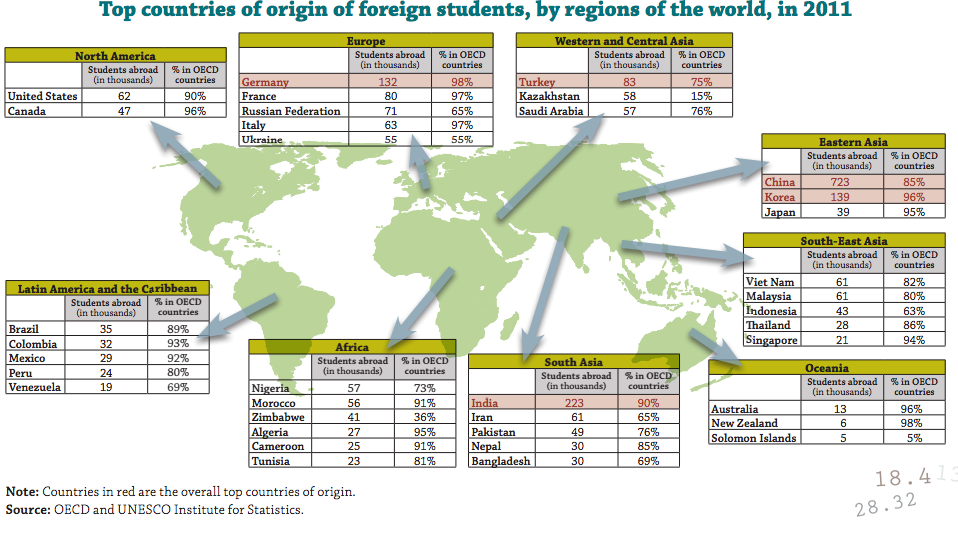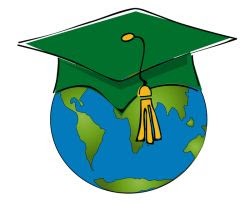Although the growth in the total number Pakistanis studying abroad has slowed since the terrorist attacks of Sept 11, 2001 in the United States, the world's sixth most populous nation continues to be among the leading sources of foreign students in America, Europe, Australia and new emerging higher education destinations in Asia.
As the number of Pakistani students in the United States has declined from a peak of 8,644 students (ranked 13th) in 2001-02 to 5,222 in 2009-10 (ranked 23rd), English-speaking OECD nations of the United Kingdom and Australia have become the biggest beneficiaries getting increasing market share of the Pakistan education market. Both nations have benefited in spite of the fact that the UK and Australian visa rejection rates for Pakistanis are higher than for students from other nations.
A recent British Council report says that 9,815 Pakistani students (Source: HESA) put Pakistan among one of the top six countries which account for 54 percent of the UK’s (non-EU) international students. Since September 2001, it has become the market leader, a place previously held by the US. In addition to Canada in North America, several Northern European countries, including Sweden and Finland, have also become quite active in marketing their education in Pakistan. As a result, these nations are attracting thousands of Pakistani students to their universities.
There is also an upward trend in Pakistani students studying in Australia. 8,458 Pakistani students studied in Australia in 2009/2010, increase of 11/4% over 2008/2009 (Source: AEI).
The US is beginning to pick up more of the Pakistani education market share after a significant decline since 911, with its simplified visa procedures and increased marketing efforts, and the excellent scholarship opportunities that they have to offer Pakistani students. Pakistan now has the world's largest Fulbright Scholarship Program with over 200 scholarships offered to Pakistani students for advanced degrees in 2011.
Beyond the traditional destinations in OECD nations, newly industrialized countries such as Thailand, Malaysia and Singapore are more visible in Pakistan and perceived as offering quality education at lower prices.
Pakistanis take education seriously. They spend more time in schools and colleges and graduate at a higher rates than their Indian counterparts in 15+ age group, according to a report on educational achievement by Harvard University researchers Robert Barro and Jong-Wha Lee.
With rising urban middle class, there is substantial and growing demand in Pakistan from students, parents and employers for private quality higher education along with a willingness and capacity to pay relatively high tuition and fees, according to the findings of Austrade, an Australian govt agency promoting trade. Private institutions are seeking affiliations with universities abroad to ensure they offer information and training that is of international standards.
Trans-national education (TNE) is a growing market in Pakistan and recent data shows evidence of over 40 such programs running successfully in affiliation with British universities at undergraduate and graduate level, according to The British Council. Overall, the UK takes about 65 per cent of the TNE market in Pakistan.
Related Links:
Pakistani Graduation Rate Higher Than India's
India and Pakistan Contrasted in 2011
Educational Attainment Dataset By Robert Barro and Jong-Wha Lee
Quality of Higher Education in India and Pakistan
Developing Pakistan's Intellectual Capital
Intellectual Wealth of Nations
Pakistan's Story After 64 Years of Independence
Pakistan Ahead of India on Key Human Development Indices
Scholarships at Foreign Universities
Institute of International Education--Open Doors


Riaz Haq
Here's an Express Tribune story of a Pakistani young man of humble origins helping terror victims after studying Emergency Medicine at Yale:
.Today, Razzak is a renowned emergency medicine expert and the executive director of the Aman Foundation. He started his schooling at a humble primary school in Lyari, completing his secondary education from Nasira School in Depot Lines. Not one to be held back, the hard-working student subsequently attended Adamjee Science College where his impressive grades and unbounded enthusiasm won him a scholarship at the prestigious Aga Khan University Hospital (AKUH), the top private medical institution in the country.
---------
In collaboration with the Edhi Ambulance Service, an arm of the philanthropic Edhi organisation and the largest volunteer ambulance network in the world, he researched and analysed road traffic injuries and emergency cases. Edhi had a mountain of documentation for every call and every case it had handled in the last two decades. The downside? None of it was digitised, so he spent days sifting through it manually.
The experience stayed with him, and the data revealed a disturbing pattern. Gruesome injuries, often suffered by the poorest members of society, were often improperly handled by well-meaning doctors, simply because of a lack of know-how. These mistakes frequently, and literally, led to the loss of life and limb.
Yet, Razzak soon realised that he needed more professional training and specialisation courses before he could progress further. He sat for the US Medical Licensing Exams (MLE) and had observations at the Beth Israel Medical Centre, New York, and the Yale-New Haven Hospital, Connecticut. In 1996, his residency and training programme at Yale University’s School of Medicine started and in 1999, he was given the ‘Best Trainee’ award by the State of Connecticut.
On the personal front, Yale was also important for the doctor since he met his future wife there. Following graduation, the two stayed in the US for a few years, always looking forward to the time when they would return home. “The plan was always to come back,” says Razzak. “That’s why we never bought a house, never completely settled in.”
Before they could come back, Razzak did his PhD in Public Health at the world-renowned Karolinska Institutet in Sweden, where he focused on the use of ambulance data for monitoring road traffic accidents. Finally, in 2005, the studious boy from Kharadar returned to Pakistan as a successful, qualified expert in emergency medicine.
He joined his alma mater, AKUH as a faculty member and went on to successfully found Pakistan’s first emergency medicine service (EMS) training programme at the university. “There were many doctors who were awarded their degrees without ever administering cardiopulmonary resuscitation (CPR) as it wasn’t a requirement,” he reveals.
This changed when his EMS programme became a mandatory rotation that all students had to serve. Subsequently, Razzak went on to build and head a new emergency department. Yet, the battle was just half won. Students in the new department faced a dilemma, similar to the one Razzak had as a student. They were required to go to the United Kingdom to sit for their exam, otherwise they would not be considered qualified.
-----------
Determined to remove, for others, the hurdles that he himself had crossed only after many toils, Razzak collaborated with the College of Physicians and Surgeons Pakistan (CPSP) to organise a curriculum for the specialised field. The first batch for this course was enrolled last year. Now students wanting to specialise in emergency medicine will be able to obtain certification in their chosen field, without having to travel abroad....
http://tribune.com.pk/story/300042/positive-pakistani-call-of-du
Dec 4, 2011